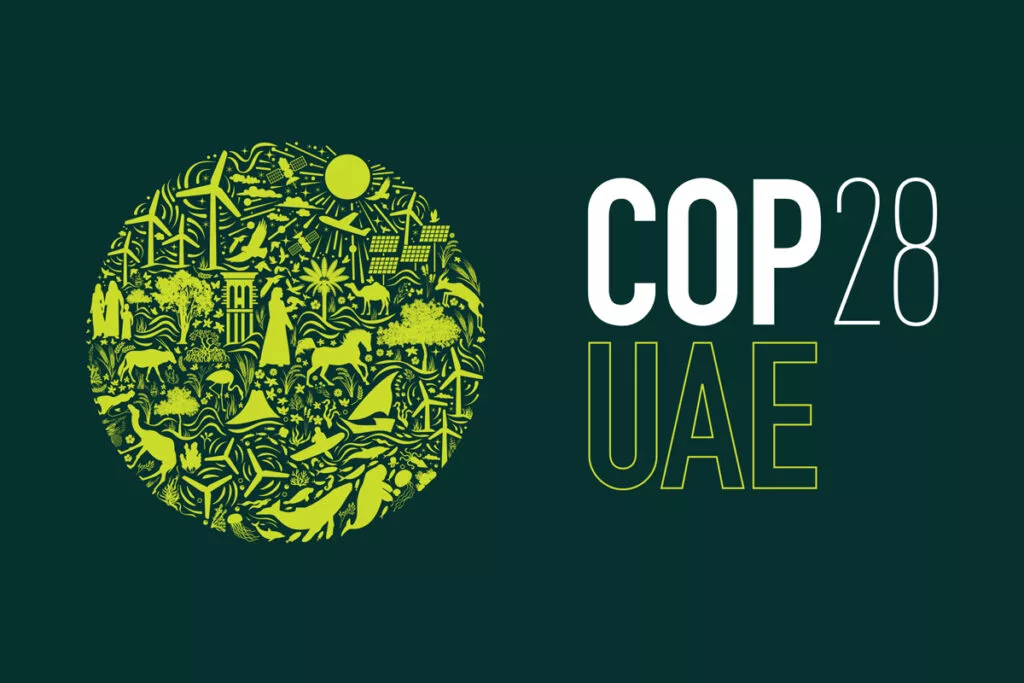
Last week marked the conclusion of the 28th Conference of Parties (COP28) to the United Nations Framework Convention on Climate Change (UNFCC) in Dubai, United Arab Emirates (UAE). As we previously discussed, the expectations were COP28 would tackle a range of critical issues toward achieving the climate goals set out in the Paris Agreement. Below is an overview of the most significant developments coming out of Dubai, as reflected in the COP28 agreement, and the expectations for future climate action.
- UAE Consensus. COP28 marked the first “Global Stocktake,” which is intended to identify the status of the global efforts to address climate change in order to inform governments when they assess and update their national goals and actions to achieve the overall objectives of the Paris Agreement. The consensus in Dubai was a recognition that “limiting global warming to 1.5°C with no or limited overshoot requires deep, rapid and sustained reductions in global greenhouse gas emissions of 43 per cent by 2030 and 60 per cent by 2035 relative to the 2019 level and reaching net zero carbon dioxide emissions by 2050.”
As part of the nation-specific planning process, a critical question for COP28 was what is the future of fossil fuels as part of the decision-making heading into 2025, when governments are to establish new Nationally Determined Contributions (NDCs) under the Paris Agreement taking into account the Global Stocktake. There were multiple, competing visions for how fossil fuels should be addressed, including whether any COP28 agreement should call for a “phase down” or a “phase out” of fossil fuels. Other nations called for a focus on the development, use, and scaling up of carbon capture, utilization, and storage (CCUS) and other technologies to reduce the emission of carbon dioxide from traditional fossil fuel-focused industrial sectors. Notably, any agreement would need to be based on consensus (i.e., all 198 nations), and other countries opposed any mention of fossil fuels in any COP28 agreement.
COP28 went into extra innings in an attempt to address this question. With the UAE leading the charge, compromise language was agreed to that calls for “[t]ransitioning away from fossil fuels in energy systems, in a just, orderly and equitable manner, accelerating action in this critical decade, so as to achieve net zero by 2050 . . .” The majority opinion appears to be that the UAE Consensus language is a significant development, given it is the first time an international agreement on climate change specifically addressed the future of fossil fuels. Past UN-led climate agreements have called on nations to reduce greenhouse gas emissions but declined to explicitly mention the words “fossil fuels.” Notably, this agreement is not legally binding. What that means is that it will be up to each country, as part of the process to update their NDCs, to determine how to incorporate, if at all, the COP28 agreement’s call to transition away from fossil fuels.
In the US, we may see this language cited to support state-specific climate change-focused regulatory actions and private-sector actions, including decisions related to financing fossil-fuel-related projects. But oil and gas production in the US, which is largely based on market factors, is at historically high levels, and key geopolitical allies are spending billions on new oil and gas infrastructure, in part to support utilization of US-supplied fossil fuel feedstocks. The meaning and import of the UAE Consensus will likely be the focus of the COP process and nation-specific implementation moving forward.
- Renewable Energy. To effectuate this “transition,” the COP28 agreement calls for “[t]ripling renewable energy capacity globally . . . by 2030.” However, renewable energy faces an increasing number of challenges, including distribution bottlenecks, environmental permitting timelines, third party litigation focused on preventing renewable energy projects, higher interest rates, and continued supply chain disruptions, among other hurdles. As discussed below, this COP28 goal is only possible with a significant increase in financial resources to support renewable projects, which is particularly true for emerging economies. Many African nations at COP28 argued that without outside financial assistance they would need to first utilize available and cost-effective oil and gas resources to become wealthy enough to invest in zero-emission renewable energy resources. The pace of renewable energy investment and development will be a key metric toward the progress of meeting the goals in the Paris Agreement.
- Nuclear Energy. The COP28 agreement specifically calls for accelerating nuclear energy solutions and marks the first time nuclear energy has been formally specified as one of the solutions to climate change in a COP agreement. Furthermore, during COP28, 24 countries backed a Ministerial Declaration calling for the tripling of global nuclear energy capacity by 2050, recognizing that new nuclear technologies could occupy a small land footprint, partner well with renewable energy sources, and have additional flexibilities that support decarbonization beyond the power sector.
- Accelerating Climate Mitigation Technologies. A consensus position at COP28 was the call for the acceleration of zero- and low-emission technologies, including “abatement and removal technologies such as carbon capture and utilization and storage, particularly in hard-to-abate sectors, and low-carbon hydrogen production.” While certain NGOs and a minority of others oppose, for example, carbon capture and utilization and storage (CCUS) and hydrogen production, this is an issue where there is largely consensus at the international, national, and subnational levels, including states as divergent politically as California and Texas. In the US, in part due to the Inflation Reduction Act and similar federal legislation, there is – and will continue to be – significant investment and development into CCUS, hydrogen, and related infrastructure projects.
- Financing. As noted above, the transition from fossil fuels and the scaling of renewable energy projects and climate mitigation technologies is not possible without a significant increase in financing, particularly for transition efforts in developing economies. For example, the COP28 agreement calls for $4.3 trillion per year in global investment in clean energy up until 2030, and then $5 trillion per year up until 2050, in order to meet net zero emissions by 2050; however, the current level of global financing of clean energy projects is $1.8 trillion per year. Consequently, the COP28 agreement calls on multilateral development banks and other financial institutions to scale up investments in climate action and increase the scale of climate finance, while also calling for the reform of such multilateral development banks to accelerate such expansion. The agreement calls on the shareholders of the World Bank and the other multilateral development banks to update the architecture associated with global climate change mitigation-focused investment, with an emphasis on increasing the use of grants and concessional instruments as climate finance tools. The agreement goes on to emphasize the importance of “ . . . central banks, commercial banks, institutional investors and other financial actors with a view to improving the assessment and management of climate-related financial risks, ensuring or enhancing access to climate finance in all geographical regions and sectors, and accelerating the ongoing establishment of new and innovative sources of finance.” Financing climate mitigation and the energy transition will likely continue to be a focal point in future climate negotiations.
- Loss and Damage Fund. A priority heading into Dubai was finalization of the “loss and damage” fund established during COP27, which is a fund to help vulnerable countries – which often contribute less greenhouse gas emissions – to recover and rebuild from climate change-driven damage. There was concern this issue could play a spoiler to achieving further progress at COP28, but on day one an agreement was reached on the loss and damage fund. The key issue remains investment into this fund. Certain nations made large commitments in Dubai (e.g., the UAE and Germany made $100 million contributions), but the fund is meant to be capitalized with at least $100 billion, illustrating the current lack of funding for climate mitigation and climate adaptation and recovery.
- Carbon Markets. Global carbon markets and continuing implementation of Article 6 of the Paris Agreement was another priority agenda item at COP28. During COP26, the overarching rules for Article 6 carbon markets were established, but there are still questions on implementation. For example, for Article 6.2 markets (i.e., trading carbon offsets between countries), there are still questions associated with the process for authorization of emission reduction actions. There are bigger outstanding issues with Article 6.4 markets (i.e., trading carbon offsets involving private and public entities), where the rules, methodologies, and procedures need to be finalized to unlock the potential of a centralized global carbon market to cost-effectively drive down greenhouse gas emissions. Unfortunately, carbon markets and Article 6 was one of the bigger disappointments of COP28, as the negotiations in relation to Articles 6.2 and 6.4 broke down, and no text was able to be agreed for these topics.
While there was lack of progress on Article 6 implementation, the expectation is that we will see countries attempt to implement nation-to-nation trading under Article 6.2. In addition, we expect further developments associated with voluntary carbon markets but with an increase in regulatory scrutiny. For example, California recently enacted Assembly Bill 1305, which focuses on regulating claims associated with the sale and purchase of voluntary carbon offsets, and the US Commodity Futures Trading Commission has proposed guidance regarding the listing for trading of voluntary carbon credit derivative contracts.
The COP moves to Baku, Azerbaijan in 2024, with plenty of issues remaining to be resolved, in particular the role of fossil fuels, how to finance the energy transition – in particular in developing economies – and how to refine the Article 6 framework to maximize the potential of carbon markets. Given that there is increasing public pressure on governments to address climate change and that nations are expected to establish updated Nationally Determined Contributions in 2025 under the Paris Agreement, 2024 promises to be an eventful year in the advancement of the issues central to global climate change and the energy transition.
- Partner
George Borovas is the head of the firm’s nuclear practice and serves as the Managing Partner of the Tokyo office.
Ranked as a Leading Partner for Projects and Energy by The Legal 500 Asia Pacific 2026, George advises governments ...
- Partner
Shannon is the managing partner of the firm’s San Francisco office and a trusted advisor to her clients. As the leader of our California environmental practice and co-leader of our nationwide environmental, social, and ...
- Partner
As a former US Environmental Protection Agency (EPA) attorney, Sam utilizes his agency, regulatory, enforcement, and practical experience to help his clients navigate environmental, energy, natural resource, sustainability ...
- Partner
Ben advises lenders, governments, and sponsors on the provision of debt, equity, political risk insurance and other types of credit support for high-value infrastructure investments. He regularly acts for lenders (including ...
- Partner
Doug represents sponsors and investors in energy and other infrastructure transactions of varying structure and complexity. Doug primarily focuses his practice on the power generation sector, and more specifically on ...
- Counsel
Clare has experience in an array of regulatory matters related to transportation and energy industry project permitting, construction, recordkeeping and regulatory compliance. She has assisted a diverse set of clients—from ...
- Partner
Ryan’s practice focuses on energy and infrastructure projects located in the U.S. and in emerging and frontier markets. Ryan is a frequent speaker and author on topics related to the development and financing of energy projects ...
- Partner
Chuck Knauss has been repeatedly lauded by clients in Chambers USA. From 2011 through 2023, Chambers USA has reported that Chuck impresses clients with his “extraordinary strategic and analytical capabilities—he finds ...
- Special Counsel
Mike is head of the firm’s Business Practice Group. He has an extensive corporate securities and mergers and acquisitions practice that is focused on the energy industry. His practice includes a particular emphasis on ...
Search
Recent Posts
Categories
- Agreements
- Air
- Batteries
- California
- Carbon
- Carbon Markets
- CERCLA
- Chemicals
- Climate
- Coal
- Duty to Defend
- Election
- Endangered Species
- Energy Transition
- Enforcement
- Environmental
- Environmental Justice
- Environmental Law
- EPA
- ESG
- General
- General Liability
- Manufacturing
- Mining
- Natural Resources
- Oil & Gas
- Permitting
- PFAS
- Policy
- Renewables
- Trade Agreements
- Utilities
- Waste
- Water
Tags
- 2015 Standards
- 2018 Farm Bill
- 2020 Presidential Election
- 2022 Scoping Plan for Achieving Carbon Neutrality
- 316(b)
- 3D Printer
- 3D Printing
- 4(d) Rule
- 404
- 404 permits
- 404(g)
- 45Q
- AB 1200
- AB 2503
- AB 617
- Abeyance
- ABS
- ACE
- Acrylonitrile-Butadiene-Sytrene
- active guidance
- ADAO
- Adaptation
- Adjacent
- Administration
- Administrative Agencies
- Administrative Law
- Administrative Procedure Act
- Administrator Pruitt
- Adverse Modification
- Advertising
- Advisory Opinions
- Affordable Clean Energy
- Aftermarket Parts
- Agency
- Agency Budget
- Agency Finance
- Agency for Toxic Substances and Disease Registry
- Agency Guidance
- Agency Interpretation
- Agent
- Agriculture Improvement Act of 2018
- Air
- Air Emissions
- Air Permit
- Air Pollution
- Air Quality
- Air Quality Implementation Plan
- Air Quality Management District
- Air Quality Management Plan
- ALARP
- Alexandria Ocasio-Cortez
- Algae
- Allco Finance Unlimited v. Klee
- Allegheny
- Alternative Energy Portfolio
- Alternative Energy Portfolio Standard
- Ambient Air
- Amendments
- America's Water Infrastructure Act
- American Bar Association
- American Jobs Plan
- AMLO
- Anadarko Petroleum
- Andrés Manuel López Obrador
- Annie Kuster
- Anthony Kennedy
- Anti-Backsliding
- Anti-terrorism
- Antibacterial
- Antitrust
- AOC
- APA
- Appropriations
- APS
- AQMP
- Aquaculture
- Arbitration
- Arctice Grayling
- Arizona
- Army Corps of Engineers
- ARPA-E
- Articles
- Artificial Intelligence (AI)
- Artificial Island transmission project
- Asbestos
- Asbestos Disease Awareness Organization
- Assumption
- Atlantic Coast Natural Gas Pipeline
- Audubon Society
- Auer
- Auer Deference
- Autonomous Vehicles
- Auxiliary Emissions Control Devices
- BAAQMD
- Backstop Siting
- Backup generators
- BACT
- Bag Ban
- Bald and Golden Eagle Protection Act
- Bankruptcy
- BART
- Baseload
- Batteries
- battery storage
- Bay Area Air Quality Management District
- Beauty products
- Beneficial Use
- Beneficial Use and Reuse
- Bernie Sanders
- Best Available Control Technologies
- Beto O'Rourke
- BGEPA
- Biden Administration
- Bilateral Investment Treaty
- Biological Opinion
- Bipartisan Budget Act
- BIT
- Black-Capped Vireo
- BLM
- Blue Ribbon Task Force
- BOEM
- BOP
- Boston
- Boundary
- Brand Memo
- Brent Spar
- Brett Kavanaugh
- Brownfields
- BSEE
- Budget Proposal
- Bureau of Land Management
- Bureau of Ocean Energy Management
- CAA
- CAISO
- Cal-OSHA
- CalEPA
- California
- California Air Resources Board
- California Coastal Act
- California Consumer Protection Act of 2018
- California Department of Public Health
- California Department of Toxic Substances
- California Environmental Protection Agency (CalEPA)
- California Environmental Public Health and Workers Defense Act of 2019
- California Environmental Quality Act
- California Legislature
- California Mining
- California Ocean Protection Council
- California OEHHA
- California Proposition 13
- California Proposition 65
- California Regional Water Quality Control Boards
- California State Lands Commission
- California State Water Resources Control Board
- California Superior Courts
- California Title 8
- California Water Code section 13304
- California's Safe Drinking Water and Toxic Enforcement Act
- California-China Clean Technology Partnership
- Cannabis
- Cap In Place
- Cap-and-Trade
- Capital Asset Pricing Model
- CAPP
- CARB
- Carbon Capture
- Carbon Capture and Sequestration
- Carbon Capture Demonstration Projects Program
- Carbon Capture Large-Scale Pilot Projects
- Carbon Capture Utilization and Storage
- Carbon Credits
- Carbon Dioxide
- Carbon Dioxide Removal
- Carbon Intensity
- Carbon Markets
- Carbon Nanotubes
- Carbon Utilization
- CASAC
- Categorical Exclusion
- CBD
- CBI
- CCPA
- CCPS
- CCR
- CCR Rule
- CCS
- CCS Alliance
- CCUS
- CDP
- CDR
- CECP
- CEJST
- Center for Chemical Process Safety
- Centralized Waste Treatment
- CEQ
- CEQA
- CERCLA
- Certificate of Public Convenience and Necessity
- Certification
- Certified Unified Program Agencies
- CESER
- CFATS
- CFCs
- CFE
- CGL
- Chambers USA
- Chapter 91
- Chemical
- Chemical Data Reporting
- Chemical Exposure
- Chemical Risk Assessment
- Chemical Safety Board
- Chemicals
- Cheryl LaFleur
- Chevron Deference
- Cheyenne River Sioux
- Chloroflourocarbons
- Chlorpyrifos
- Chrysotile Asbestos
- CIP
- Circular Economy
- CITES
- Citizen Petition
- Citizen Suit
- Civil Penalties
- Civiletti
- Claims-Made
- Class VI
- Class VI Primacy
- Class VI Underground Injection Control
- Clean Air Act
- Clean Development Mechanism
- Clean Energy
- Clean Energy Resources
- Clean Energy Standard
- Clean Hydrogen
- Clean Peak Energy Certificates
- Clean Power Plan
- Clean Water Act
- Clean Water Act Section 401
- Clean Water Act Section 404
- Cleaning Products
- Cleanup
- Climate
- Climate Change
- Climate Disclosure
- Closure by Removal
- CNTs
- CO2
- CO2 Emissions
- Coakley Order
- Coal
- Coal Ash
- Coal Ash Basins
- Coal Combustion Residuals
- Coal Leasing Moratorium
- Coal Mine Health and Safety Act
- Coal Production
- Coalition for Competitive Electricity v. Zibelman
- Coastal
- Coastal Zone Management Act
- Colorado
- Comisión Federal de Electricidad
- Commercial General Liability
- Commercial Information
- Common Law
- Community Air Protection Program
- Compliance
- Comprehensive Environmental Response Compensation and Liability Act
- concurrent-remedies doctrine
- Confidential Business Information
- Congress
- Congressional Research Service
- Congressional Review Act
- Consent Decree
- Conservation Easement
- Considerations
- Constitutional Law
- Consultation
- Consumer Data
- Consumer Product Exposure Warnings
- Consumer Products
- Consumer Products Safety Commission
- Contaminated Sites
- Contribution Threshold
- Controlled Substances Act of 1970
- Cook Inlet
- Cookware
- Cooling Water Intake Structures
- Cooperative Federalism
- COP26
- COP28
- COP28 Agreement
- Coronavirus/COVID-19
- Corporate Governance
- Corporate Social Responsibility
- Corporate Sustainability
- Corporate Sustainability Reporting Directive
- Corporate Sustainability Reporting Directive (CSRD)
- Corporate Valuation
- Corps
- Cosmetics
- Cost of regulation
- Council on Environmental Quality
- County of Maui
- COVID-19
- CPCN
- CPECs
- CPP
- CPS
- CPSC
- CPUC
- CRA
- Criminal Enforcement
- Critical Electric Infrastructure Information
- critical habitat
- Critical Habitat Designation
- Critical Infrastructure
- Critical Infrastructure Protection
- Critical Materials
- Critical Minerals
- Critical Minerals Committee
- Cross-State Air Pollution Rule
- CSA
- CSAG
- CSAPR
- CSB
- CSR
- CSR reports
- CSR Standards
- CSR- and ESG-related risks
- Cultural Resources
- CWA
- CWA Citizen Suit
- CWA section 401
- CWA Section 404
- Cyber-Related Risks
- Cybersecurity
- D&O
- D&O Insurance
- Dakota Access Pipeline
- DAPL
- DARTIC
- Data
- Data centers
- Data Security
- DC Circuit
- DC Circuit Court of Appeals
- DCH
- Deadline Suits
- Deadlines
- Decarbonization
- Decommissioning
- Deep-Well Injection
- Deepwater Horizon
- Defeat Devices
- Defense Costs
- Deference
- Deidre G. Duncan
- Delisting
- Democratic Debate
- DEP
- Department of Defense
- Department of Energy
- Department of Homeland Security
- Department of Justice
- Department of Labor
- Department of the Interior
- Department of Transportation
- Designations
- Development
- Device
- Diligent Prosecution
- Dioxane
- Directors & Officers
- Director’s Order
- Discharge
- Diversity and Inclusion
- DJSI
- DOD
- DOE
- DOER
- DOI
- DOJ
- DOJ ENRD
- Domestic Energy Policy
- Domestic Terrorism
- DOSH
- DOT
- Dow Jones Sustainability Index
- DPR
- DPU
- Draft
- Draft EA
- Draft Environmental Assessment
- drinking water
- Drinking Water Standards
- Drought
- DTSC
- Due Diligence
- Duke Energy
- Duty to Defend
- Dynamic Scoring
- E&P Wastes
- EA
- eagle
- Eagle Take Permit
- Earth Day
- Economic Impact
- Economic Impacts
- Effluent
- Effluent Guidelines
- Effluent Limitations
- EHSS
- EIS
- EJSCREEN
- Election 2020
- Electric Ratepayers
- Electric Transmission
- Electric Vehicles
- Electricity
- Electricity Markets
- ELG
- ELGs
- Elizabeth E. Aldridge
- Elizabeth Warren
- Emergency generators
- Emergency Planning and Community Right-to-Know Act
- Emergency Response
- Emergency Support Functions
- Emerging Contaminants
- Emission Caps
- Emission Control Requirements
- Emission Reduction Credits
- Emissions
- Emissions Caps
- emissions reporting
- Emphasis List
- Endangered Species
- Endangered Species Act
- Energy
- Energy Dominance Financing
- Energy Industry
- Energy Infrastructure
- Energy Loan Programs Office
- Energy Package Insurance
- Energy Policy Act
- Energy Reforms
- Energy Storage
- Energy Transition
- Enforcement
- Enforcement Discretion
- Enforcement statistics
- Engine Certification
- Enhanced Oil Recovery
- ENRD
- Environment
- Environment and Natural Resources Division
- Environmental
- Environmental and Social Governance
- Environmental Appeals Board
- Environmental Assessment
- Environmental Bar
- Environmental Compliance
- Environmental Crimes
- Environmental Defense Fund
- Environmental Disclosure
- Environmental Due Diligence
- Environmental Enforcement
- Environmental Groups
- Environmental Impact Statement
- Environmental Justice
- Environmental Justice and Equity Board
- Environmental Law
- Environmental Law Institute
- Environmental Markets
- Environmental Permitting
- Environmental Protection Agency
- Environmental Protection Agency (EPA)
- Environmental Rights
- Environmental Social and Corporate Governance
- Environmental Social and Governance
- Environmental Social Governance
- Environmental Social Justice
- Environmental Transactions
- EO 13891
- EOR
- EP3
- EP4
- EPA
- EPA audit policy
- EPR
- EPR Laws
- Equator Principles
- Equator Principles Association
- ERC
- ESA
- ESA consultation
- ESA section 7 consultation
- ESG
- ESG Diligence
- ETP
- EU
- European Climate Law
- European Green Deal
- European Sustainability Reporting Standards
- European Union
- Evaluation of Regionalization for Potential New Wastewater Systems
- EVs
- Exceptional Events
- Exceptional Events Rule
- Excess Insurance
- Excess Liability
- Exchange Act
- Executive Compensation
- Executive Memorandum
- Executive Office for United States Attorneys
- Executive Order
- Executive Order 13777
- Executive Order 14008
- Executive Order N-8-23
- Executive Orders
- Extended producer Responsibility
- Extended Producer Responsibility (EPR)
- Fair and Equitable Treatment
- Fair Labor Standards Act
- FAR
- FAST Act
- FAST-41
- Fathead Minnow
- Fatmucket Mussel
- FDA
- FECM
- Federal Acquisition Regulations
- Federal Action
- Federal Agencies
- Federal Agency Action
- Federal Budget
- Federal Energy Regulatory Commission
- Federal Lands
- Federal Permit
- Federal Power Act
- Federal Preemption
- Federal Register
- Federal Rule 20
- Federal Rule 71.1
- Federalism
- Fees
- FERC
- FET
- Fiduciary Liability
- FIFRA
- Fifth Circuit
- Final Rule
- Financial Information
- Fireworks
- First Amendment
- Fishing Industry
- Flaring
- Flint
- FloaTEC LLC
- Flood Infrastructure Funding
- Flood Mitigation
- Florida
- FLSA
- FOIA
- Food
- Food and Drug Administration
- Food and Drug Administration (FDA)
- Food Loss and Waste
- Food Marketing Institute
- Food Marketing Institute v. Argus Leader Media
- Food Waste
- Food Waste Reduction Alliance
- Fossil Fuels
- Fourth Circuit
- Fourth of July
- FPA
- FPA Preemption
- FPA section 202(c)
- FPOS
- Fracking
- Framework
- Framework Rule
- Fraud
- Free Trade Agreement
- Freedom of Information Act
- Freeport
- FSLA
- FTA
- Funding for Environmental Protection
- Funding Mechanism
- FUTURE Act
- FWS
- FY2017 budget
- FY2018
- GAO
- Gas
- GDPR
- Gender Equality
- General Data Protection Regulation
- General Industrial Stormwater Permit
- General Permit
- GenX
- George Clemon Freeman Jr.
- GHG
- GHG Emissions
- GHG Emissions Renewable Portfolio Standard
- Gilbert & Sullivan
- Global Carbon Markets
- Global Climate Negotiations
- Global Reporting Initiative
- Global Warming Solutions Act
- Glyphosate
- GOM
- Good Neighbor Obligation
- Good Neighbor Provision
- Government Investigations
- Grand River Dam Authority
- Grassroots Activisim
- Green Admendment
- Green Communities Act
- Green Deal
- Green New Deal
- Green New Deal; Climate Change
- Greenhouse Gas
- Greenhouse Gas Emissions
- Greenhouse Gas Protocol
- Greenhouse Gas Protocol Initiative
- Greenhouse Gases
- Grid
- grid reliability
- grid study
- Grocery Manufacturers Association
- Groundwater
- Guam
- Guidance
- Guidance Portal
- Gulf of Mexico
- Habitat
- Hardrock Mining Rule
- Harmful Algal Blooms
- Hawaii
- Hawkes
- Hazardous Air Pollutants
- Hazardous Materials Regulations
- Hazardous Waste
- HBCD
- HCFCs
- Health
- Health Advisories
- Health Advisory
- Health and Safety
- HECT
- Hemp
- HFCs
- High-Density Polyethylene (HDPE)
- Highly Reactive Volatile Organic Compound Emissions Cap and Trade
- Historical Matter
- HMR
- Holder
- Homeland Security
- Hoopa Valley Tribe
- House
- House of Representatives
- Houston Casualty
- Human Health Toxicity Values
- Human Rights
- Hurricane Harvey
- Hydraulic Fracturing
- Hydroelectric Relicensing
- Hydrofluorocarbons
- Hydrofluorocarbons (HFCs)
- Hydrogen
- Hydrogen Energy Earthshot
- Hydrological Connection Theory
- Hydropower
- ICMM
- ICSID
- IFC Performance Standards
- IGP
- IIA
- IIJA
- Impaired Waterbodies
- Impaired Waters
- Impairment
- Incident Response
- Incidental Take
- incidental take statement
- Indian Lands
- Indigenous Traditional Ecological Knowledge
- Indonesia
- Industrial Accidents
- Industrial Hemp
- Infectious Disease Preparedness and Response Plan
- Inflaction Reduction Act
- Infrastructure
- Infrastructure Development
- Infrastructure Investment and Jobs Act (IIJA)
- infrastructure security
- Initial & Boundary
- Innovation
- Inside Look
- Inspections
- Insurance
- Insurance Recovery
- Integrated Science Assessment
- Interagency Review
- Intergovernmental Panel on Climate Change
- Interior
- International Arbitration
- International Centre for Settlement of Investment Disputes
- International Council on Mining and Metals
- International Energy Agency
- International Environmental Law
- International Investment Agreements
- International Petroleum Industry Environmental Conservation Association
- Interstate Transport
- Intervention
- Investment Risk Assessment
- IPCC
- IRIS
- IRIS Review
- IRS
- ISO-NE
- ITEK
- Jay Inslee
- Jewell
- Joe Biden
- John Hickenlooper
- Joint Venture Provision
- Judicial Review
- Judiciary
- Jurisdiction
- Jurisdictional Determination
- Justice40
- Kamala Harris
- Kavanaugh
- Kenk’s amphipod
- Kevin McIntyre
- Keystone XL
- Kigali Amendment
- Kisor
- Kisor Deference
- Kyoto Protocol
- Lake Erie
- Lake Powell Pipeline Project
- Lampsilis Siliquoidea
- Land Use
- Late Notice
- Lautenberg Act
- Law360
- LCPFAC SNUR
- LDC
- LDNR
- Lead
- Lead and Copper Rule
- Lease Sale
- Legislation
- Lesser Prairie Chicken
- Li-ion
- Liability
- Liability Insured
- Linear
- Liquefied Natural Gas
- Lithium-ion batteries
- Litigation
- Lloyds
- Lloyd’s of London
- LNG
- London Protocol
- Long-Form Warning
- Look-back period
- Louisiana Department of Natural Resources
- Low Carbon Fuel Standard
- MA DOER
- Maine
- Maine Department of Environmental Protection
- Maintenance Fees
- Malaysia
- Manufactured Products
- Manufacturers
- Manufacturing
- Marijuana
- Maritime
- Markets
- Masias
- Mass Emissions Cap and Trade
- Massachusetts
- Massachusetts AG
- Massachusetts Clean Energy Center
- Massachusetts Climate Act
- Massachusetts Department of Energy Resources
- Massachusetts Global Warming Solutions Act
- MassCEC
- MATS
- Maximum Contaminant Levels
- MBTA
- MBTA; Wind Energy; Renewable Energy; protected species; natural resources; USFWS
- McGraw-Edison
- McIntyre
- MCL
- MCLG
- MCLs
- McNamee
- MEA
- MECT
- Mergers & Acquisitions
- Methane
- methane emissions
- Methane Repeal Rule
- Methylene Chloride
- Michigan
- microplastics
- Midnight Rule
- Midstream
- Migratory Bird Treaty Act
- Migratory Birds Treaty Act
- Millennium Pipeline
- Mineral Law of 1872
- Mineral Leasing Act
- Mineral Policy
- Mining
- Mining Claims
- Minnesota
- Minnesota Pollution Control Agency (MPCA)
- Misbranding
- Mitigation
- Mitigation Rule
- MLP
- Modification
- Monitoring
- Monsanto
- Montana
- Montreal Protocol
- Moratorium
- MOU
- Mountain Valley Pipeline
- MSGP
- Multi-Sector General Permit
- Multiyear Plan for Energy Sector Cybersecurity
- Mulvaney
- Murray
- Murray Energy
- MVP
- NAAQS
- NAFTA
- NAIOP
- NALs
- Nancy Pelosi
- NATA
- National Ambient Air Quality Standards
- National Compliance Initiatives
- National Cybersecurity and Communications Integration Center
- National Defense Authorization Act
- National Determined Contributions
- National Emergency
- National Enforcement and Compliance Initiatives
- National Enforcement Initiatives
- National Environmental Policy Act
- National Historic Preservation Act
- National Hydro Association
- National Marine Fisheries Service
- National Oceanic Atmospheric Administration
- National Parks and Conservation Ass’n v. Morton
- National Petroleum Council
- National Pollutant Discharge Elimination System
- National Pollutant Discharge Elimination System (NPDES)
- National Pollution Discharge Elimination System
- National Primary Drinking Water Regulation
- National Priorities List
- National Recycling Strategy
- National Register of Historic Places
- National Restaurant Association
- National Security
- Nationwide Permit
- Native American Law
- Natural Gas
- Natural Gas Act
- Natural Gas Leak Abatement Program
- Natural Gas Pipeline Certification
- Natural Gas Pipelines
- Natural Resource Damages
- Natural Resources
- Navigable waters
- NCCIC
- NCI
- NEC
- NECIs
- NEI
- Neil Chatterjee
- NELs
- NEPA
- NEPA Policy
- NEPA Review
- NERC
- NESCOE
- Net-Zero Emissions
- Net-Zero Greenhouse Gas Emissions
- New Chemicals Review Program
- New Rule
- New Source Review
- New York
- New York Department of Environmental Conservation
- New York State Department of Taxation and Finance
- NGA
- NGO
- NHPA
- NHTSA
- NIETC
- Ninth Circuit
- nitrogen dioxide
- NMFS
- No Exposure Certification Identification Number
- No-Action Letter
- NOAA
- NOI
- NONA
- Nonapplicability Identification Number
- Nonattainment
- Nonpoint Source
- North American Electric Reliability Corporation
- North Dakota
- Notice
- Notice of Proposed Rulemaking
- NPDES
- NPDES Delegation
- NPDWR
- NPL
- NSPS
- NSR
- Nuclear
- Nuclear Energy
- NWP
- NY PSC
- Obama
- OBBB
- Occupational Safety and Health Act
- Occupational Safety and Health Administration
- OCE
- OECA
- OEHHA
- OEJECR
- Office of Civil Enforcement
- Office of Cybersecurity Energy Security and Emergency Response
- Office of Electricity Delivery & Energy Reliability
- Office of Enforcement and Compliance Assurance
- Office of Enforcement and Compliance Assurance (OECA)
- Office of Environmental Justice and External Civil Rights
- Office of Federal Register
- Office of Information and Regulatory Affairs
- Office of Management and Budget
- Office of Natural Resources
- Office of Water
- Offshore Energy
- Offshore Platforms
- Offshore Wind
- Offshore wind energy
- Ohio
- Oil
- Oil & Gas
- Oil and Gas
- Oil and Gas Production
- Oil and Gas Wastewater
- Oil Pipelines
- Oil Pollution Act
- OIRA
- Oklahoma
- OMB
- One Federal Decision
- One Federal Plan
- OPA
- Oregon
- OSHA
- Outer Continental Shelf
- OW
- Ozone
- Pacific OCS Region
- Packaging
- Paperwork Reduction Act
- Paris Agreement
- Paris Climate Accord
- Paris Climate Agreement
- Particulate Matter
- Partido Revolucionario Institucional
- Passaic River
- PATH Act
- PBT
- PCBs
- PEMEX
- Penalties
- Penalty
- PennEast Pipeline
- Pennsylvania
- Perfluoroalkyl
- Permian Basin
- Permitting
- Pesticide Devices
- Pesticides
- Pete Buttigieg
- Petition
- Petition for Rulemaking
- Petitions for Objection
- PetraNova
- Petrochemical Regulation
- Petróleos Mexicanos
- Petroleum Products
- PFAS
- PFAS Action Plan
- PFAS in Products State Law Tracker
- PFAS Reporting Rule
- PFAS Strategic Roadmap
- PFBA
- PFBS
- PFNA
- PFOA
- PFOS
- PHMSA
- Physicians for Social Responsibility
- Pimphales Promelas
- PIP
- Pipe Manufacturing
- Pipeline
- Pipeline and Hazardous Materials Safety Administration
- Pipeline Attacks
- Pipeline Construction
- Pipeline Safety
- Pipelines
- PIPES
- Plastic
- Plastic Carryout bag
- PNAS
- POCSR
- Point Source
- Point Source Discharge
- Policy
- Policy Statement
- Pollution
- Pollution Exclusion
- Pollution Liability
- Pollution Prevention for Healthy People and Puget Sound Act
- Polyalkyl
- Polyfluoroalkyl
- Port of Los Angeles
- Porter-Cologne Water Quality Control Act
- Potentially Responsible Party
- POTW
- PRA
- Practical Law
- Precedent
- Preconstruction Authorizations
- Preemption
- Prejudice
- Preliminary Injunction
- President Biden
- President Trump
- Presidential Transition
- PRGs
- PRI
- Priebus
- Principal
- Principles for Responsible Investments
- Priority Pollutants
- Privacy
- Process Safety Management
- Produced Water
- Product Safety
- Production Cuts
- Production Sharing Contract
- Prohibition on Sale
- Project Development
- Prop. 65
- Proposition 65
- Protected Species
- Protecting Our Conserved Lands Act of 2019
- PRP
- Pruitt
- Pruitt Task Force
- PSC
- PSD
- PSH
- PSM
- Public Comment
- Public Lands
- Public Utilities
- Publicly Owned Treatment Works
- Pumped Storage Hydropower
- PURPA
- Quality Assurance Plan
- R-Project Transmission Line
- Racing Vehicles
- RAGAGEP
- Railroad Commission
- Railroad Commission of Texas
- Railroad Commission of Texas (RRC)
- Rapanos
- RBI
- RCRA
- RCRA Subtitle D
- REACH
- Reasonable Progress Plans
- RECLAIM
- Reconsideration
- RECs
- Redevelopment
- Refinery
- Reform
- Reforma Energética
- Regional Clean Air Incentives Market
- Regional Clean Hydrogen Hubs
- Regional Greenhouse Gas Initiative (RGGI)
- Regional Haze
- Regional Water Quality Control Boards
- Registration Evaluation Authorization and Restriction of Chemicals
- Regulation
- Regulation and Enforcement
- Regulation S-K
- Regulation S-X
- Regulations
- Regulatory
- Regulatory Agenda
- Regulatory Freeze
- Regulatory Guidance
- Regulatory Programs
- Regulatory Reform
- Regulatory Review
- Reliability
- Reliability Safety Valve
- Remediation
- Removal Action
- Renewable
- Renewable Energy
- Renewable Energy Certificates
- Renewable Energy Portfolio
- Renewable Fuel Standards
- Renewable Portfolio Standard
- Renewables
- Renewals
- Reporting
- Request for Information
- ReRED
- Rescind
- Resilience of the Bulk Power System
- Resource Conservation and Recovery Act
- Responsible Business Initiative
- Restoration
- Restriction of Hazardous Substances
- Retail
- Retailers
- Retained
- Retroactivity
- Return on Equity
- RFS
- RHA
- Richard Glick
- Rigs to Reefs
- RIN
- Ripeness
- Risk and Technology Review
- Risk Assessment
- Risk Evaluation
- Risk Management
- Risk Management Plan
- Risk Management Program
- Risk Management Regulations
- Rivers and Harbors Act
- RMP
- Roadmap Release
- Roanoke River Basin Association
- Robert Powelson
- ROE
- ROEs
- RoHS
- Roundtable on Sustainable Palm Oil
- Roundup
- Royalties
- RPS
- RRBA
- RRC
- RTR
- Rule 14a-8(i)(7)
- Rule 65(c)
- Rulemaking
- Russia
- SAB
- Sackett
- Sacred Sites
- SAFE
- Safe Drinking Water Act
- Safe Harbor
- Safe Harbor Regulation
- Safe Harbor Warning
- Safer Consumer Products
- SAFETY Act
- Safety Management System
- San Francisco Bay Regional Water Quality Control Board
- SASB
- SaskPower’s Boundary Dam Unit 3
- SB 1371
- SCAQMD
- Science
- Science Advisory Board
- Science Advisory Board (SAB)
- Scope
- Scope 1
- Scope 2
- Scope 3
- Scott Pruitt
- SCOTUS
- SDWA
- SEC
- Section 10
- Section 104 Request
- Section 114 Request
- Section 179B(b)
- Section 208 Request
- Section 308 Request
- Section 4
- Section 401
- Section 404
- Section 408
- Section 45Q
- Section 5
- Section 6(b)
- Securities Act
- Securities and Exchange Commission
- Securities and Exchange Commission (SEC)
- Securities Law
- Seismicity
- Seminole Rock
- Senate
- Senate Energy and Natural Resources Committee
- Senator Lamar Alexander
- SEP
- SEPs
- Services
- Settlements
- Sewage
- Shareholder Lawsuits
- Shutdown
- Sierra Club
- Significant Figures
- Significant Guidance
- Significant New Use Rule
- SIP
- Smelter
- SNUR
- Social
- Social Media
- Solar
- Solid Waste
- South China Sea
- South Coast Air Quality Management District
- SPCC
- Species
- Spill Prevention Control and Countermeasure Rule
- SSB 5135
- SSM SIP Call
- Stabilization Clause
- Standing
- Standing Rock Sioux
- Stare Decisis
- State
- State Administrative Appeals
- State Air Pollution Control Board
- State Constitutions
- State Environmental Quality Review Act
- State Implementation Plan
- State Law
- State Water Resources Control Board
- States
- Statute
- Statute of Limitations
- Statutory Authority
- Statutory Interpretation
- Stormwater
- Strategic
- Straw Proposal
- Subrogation
- sulfur dioxide
- Sunset Review
- Superfund
- Supplemental Environmental Projects
- Supply Chain
- Supreme Court
- Supreme Court of Texas
- Supreme Court of the United States
- Surface Mining Act
- Surface Mining and Reclamation Act
- Surface Water Discharge
- Susan Bodine
- Sustainability
- Sustainability Accounting Standards Board
- Sustainable Development Goals
- Sustainable Investing
- SWDA
- Switzerland
- SWRCB
- Tailings Storage Facility
- Take
- Take Prohibition
- Takings
- Task Force on Climate-Related Financial Disclosures (TCFD)
- Tax
- Tax Credit
- Tax Credits
- Tax Cuts and Jobs Act
- Tax Reform
- Taxonomy Regulation
- TCEQ
- TCI
- Temporary Policy
- TERP
- Texas
- Texas Alliance of Energy Producers
- Texas Commission on Environmental Quality
- Texas Legislature
- Texas Railroad Commission
- Texas Water Development Board
- Thailand
- THC
- The European Commission
- The Mikado
- The Treasury Department
- The Water Infrastructure Improvements Act
- the WIIN Act
- Third Circuit
- Threatened Species
- Title V
- TMDL
- TMDLs
- TNALs
- Toledo
- Tolling Order
- Total Maximum Daily Load
- Toxic Chemicals
- Toxic Substances Control Act
- Toxic Substances Control Act (TSCA)
- Toxics
- Toxics Release Inventory
- Transcos
- Transition
- Transmission
- Transparency
- Transport
- Treasury
- Treaty Rights
- Trends
- TRI
- Tribal Rights
- Tribes
- Trump
- Trump Administration
- TSA
- TSCA
- TSF
- TWDB
- U.S. Army Corps of Engineers
- U.S. Environmental Protection Agency
- Ultimate Net Loss
- UNCLOS
- Underground Injection Wells
- Underground Storage Tank
- UNFCCC
- Unified Agenda
- United Airlines
- United Nations
- United Nations Framework Convention on Climate Change
- Urgenda
- US Army Corps of Engineers
- US Chemical Safety Board
- US Climate Alliance
- US Court of Appeals for the Ninth Circuit
- US Customs and Border Protection
- US Department of Agriculture
- US Department of Justice (DOJ)
- US Environmental Protection Agency
- US Fish and Wildlife Service
- US FWS
- US SAFETY Act
- US Securities and Exchange Commission
- US Securities and Exchange Commission (SEC)
- US Supreme Court
- USACE
- USDA
- USDOT
- USFWS
- USMCA
- Utilities
- Utility
- Vapor Intrusion
- Vapor Recovery Units
- VCP
- Venting
- Veto
- Village of Old Mill Creek. v. Star
- Vineyard Wind
- Virginia
- Virginia Clean Economy Act
- Virginia Community Flood Preparedness Fund
- Virginia Department of Environmental Quality
- Virginia State Corporation Commission
- Vision of Corporation Finance
- VOCs
- Volatile Organic Compounds
- Voluntary Cleanup Program
- Voluntary Remediation
- Waiver
- Waiver Period
- Warnings
- Washington
- Waste
- Waste Discharge Identification Number
- Waste Electrical and Electric Equipment
- Waste Permitting
- Wasted Food
- Wastewater
- Wastewater Treatment
- Water
- Water Quality Certification
- Water Quality Criteria
- Water Regulation
- Water Reuse
- Water Supply and Management
- Water Systems
- Waterfront
- Waters
- Waters of the United States
- WDID
- WEA
- WEEE
- Well Blowout
- Well Control Rule
- WET Tests
- Wetlands
- Whole Effluent Testing
- Wholesale Electricity
- WildEarth Guardians
- Wildfire
- Wind
- Wind Energy
- Wind Energy Area
- Wind Farms
- Winning on Reducing Food Waste Initiative
- Winter v. NRDC
- Withdrawal or Reinstatement
- World Bank Group Equator Principles
- Worst-Case Discharge
- WOTUS
- WQBELs
- WQC
- Wyoming
- Zero Emissions
- Zero-Emissions Vehicle Initiative
- Zinke
Authors
- Yaniel Abreu
- Walter J. Andrews
- Fatima Anjum
- John J. Beardsworth, Jr.
- Jordan L. Bernstein
- Timothy E. Biller
- John R. Bobka
- George Borovas
- Lawrence J. Bracken II
- Shannon S. Broome
- Karma B. Brown
- Samuel L. Brown
- F. William Brownell
- Courtney Cochran Butler
- Aaron J. Carroll
- E. Carter Chandler Clements
- Abigail Contreras
- Benjamin Y. Cooper IV
- William Cox
- Eric S. Crusius
- Christopher J. Cunio
- Alexandra B. Cunningham
- Field Daniel
- Andrea DeField
- Douglas L. Dua
- Deidre G. Duncan
- Chloe Dupre
- Frederick R. Eames
- Kevin S. Elliker
- Clare Ellis
- Latosha M. Ellis
- Joanna D. Enns
- Susan S. Failla
- Geoffrey B. Fehling
- Andrea Field
- Hannah Flint
- Steven C. Friend
- Kevin E. Gaunt
- Andrew G. Geyer
- Roger C. Gibboni
- Sevren R. Gourley
- Elisabeth R. Gunther
- Steven M. Haas
- Alexandra Hamilton
- James W. Head
- Patrick Jamieson
- Kevin W. Jones
- Laura Ellen Jones
- Dan J. Jordanger
- Ryan T. Ketchum
- Jonathan H. Kim
- Scott H. Kimpel
- Charles H. Knauss
- J. Pierce Lamberson
- Lucinda Minton Langworthy
- Charlotte Leszinske
- Brian R. Levey
- Michael S. Levine
- Elbert Lin
- Eric R. Link
- Nash E. Long
- David S. Lowman, Jr.
- Sadie Mapstone
- James Martin
- Jeffrey N. Martin
- Lorelie S. Masters
- Patrick M. McDermott
- Kerry L. McGrath
- Robert J. McNamara
- Nathan R. Menard
- Michael J. Messonnier, Jr.
- Todd S. Mikolop
- Angela Morrison
- Michael J. Mueller
- Eric J. Murdock
- Ted J. Murphy
- William L. Newton
- Paul T. Nyffeler, PhD
- Peter K. O’Brien
- G. Michael O’Leary
- Evangeline C. Paschal
- Kate Perkins
- Shemin V. Proctor
- Shawn Patrick Regan
- Myles F. Reynolds
- Doris Rodríguez
- Brent A. Rosser
- Rachel Saltzman
- Arthur E. Schmalz
- Penny A. Shamblin
- Michael R. Shebelskie
- George P. Sibley, III
- Joseph C. Stanko
- Brian T. Stansbury
- Martin P. Stratte
- Javaneh S. Tarter
- Thomas W. Taylor
- David Arthur Terry
- Linda Trees
- Andrew J. Turner
- Emily Burkhardt Vicente
- Carl von Merz
- Ayesha K. Waheed
- Gregory R. Wall
- Daniel C. Warren
- Thomas R. Waskom
- Malcolm C. Weiss
- Susan F. Wiltsie









